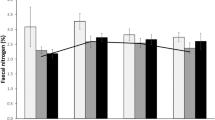Abstract
WE have become used to the idea that rickets is a vitamin deficiency condition, and yet there are several facts which militate strongly against complete acceptance of this hypothesis. The most important consideration is the fact that rickets can be produced experimentally by feeding with excess of cereals. It will be remembered that before the demonstration that rickets could be induced in puppies by a diet devoid of what we know now to be vitamin D, one theory of the etiology of rickets in infants attributed the disease to the well-known excessive carbohydrate or, to be more accurate, cereal) intake of the children.
This is a preview of subscription content, access via your institution
Access options
Subscribe to this journal
Receive 51 print issues and online access
$199.00 per year
only $3.90 per issue
Buy this article
- Purchase on SpringerLink
- Instant access to full article PDF
Prices may be subject to local taxes which are calculated during checkout
Similar content being viewed by others
Author information
Authors and Affiliations
Rights and permissions
About this article
Cite this article
MIRVISH, L. Nature of the Rickets-producing Factor in Cereals. Nature 124, 410–411 (1929). https://doi.org/10.1038/124410b0
Issue date:
DOI: https://doi.org/10.1038/124410b0


